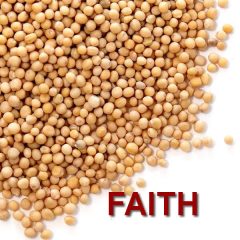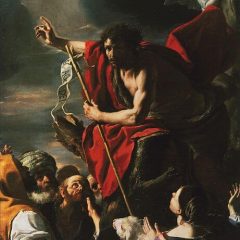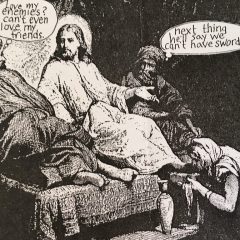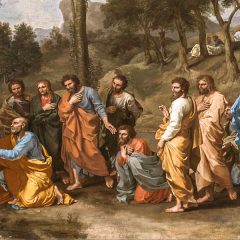faith
You Are My Beloved

Baptism of the Lord – Year A
Fr. Joonbin Lim
Preached: January 11, 2026
“This is my Son, the Beloved, with whom I am well pleased.”
Through this Gospel passage, we come to understand how deeply God the Father loves his Son, Jesus Christ.
As I reflected on these words, I found myself thinking of my father, who handed on the Catholic faith to me as a precious inheritance and who has since passed away. After a year-long battle with cancer, he died in a hospice ward. At the time, I was twenty-three years old, freshly discharged from the military, full of plans and dreams for the future.
But life unfolded in a direction completely different from what I had hoped for, and I found myself filled with deep anger—toward my father and toward God. I could not understand how a man of such deep faith could be struck by cancer, nor could I accept the reality that I now had to take responsibility for supporting the family in his place. I told myself that if the God I believed in was someone who simply stood by and allowed such things to happen, then I would no longer believe in Him, and so I walked away from the Church.
I could not understand what sin my father could possibly have committed to deserve such an illness. The father I had known all my life was a good man, a faithful husband, and someone who lived with integrity and example.
For a long time after that, I wandered. My anger toward God eventually turned inward and began to destroy me. Yet because of my younger sibling and my mother, I could not stop working, and I lived each day simply trying to endure. I relied on alcohol almost every night, and there were days when I hoped I would not wake up the next morning.
After my father’s funeral, I read the letter he had left for me. It was a long letter, and much of it has faded from memory, but one part remains clear. He wrote that he blamed no one, that I had been a truly good son to him, and he asked me to hold on to my faith.
Later, I learned from one of the sisters in the hospice ward that my father attended Mass every day until the end and helped feed other patients who could no longer eat on their own. I could not understand how he was able to live in such a way at the very end of a life that was slowly fading away.
My father did not choose baptism for himself; he was baptized as an infant. And in this, I am no different. As someone who also received infant baptism, I did not choose God by my own decision; rather, faith was given to me as a gift through God’s grace and God’s choosing.
This led me to reflect on the baptism of Jesus in today’s Gospel. Why would Jesus, who is almighty God, receive baptism from John, a mere human being? And why would the sinless Lord submit to a baptism of repentance meant for sinners? Scripture tells us that “John the Baptist appeared in the desert proclaiming a baptism of repentance for the forgiveness of sins” (Mark 1:4), and Jesus went to him and received that very baptism. In this way, Jesus began his public ministry by standing in the place of sinners.
And at the end of his public ministry, he stood in that same place. “Pilate had Jesus scourged and handed him over to be crucified” (Mark 15:15). From beginning to end, Jesus placed himself before the world as one counted among sinners. If Jesus committed any sin at all, it was the sin of loving—loving every sinner without exception. He allowed himself to be counted as a sinner in baptism, and he carried upon his shoulders the weight of the world’s sin, more than enough to cover all humanity, and died on the cross.
To be baptized and become a child of God may appear, at first glance, to be our own choice, but in truth it can never happen without God’s will and God’s call. A selective faith—one that comes to church when we are happy and walks away when we are sorrowful or confused—is not the faith we are given. Faith is not something we choose according to our emotions or convenience; it is a covenant between God and
ourselves, a promise that we too will walk the path that Jesus walked.
To live the love that Jesus showed, even knowing that it would lead to death by cancer; to entrust oneself to Christ, who loved us to the very end even though he knew the cross awaited him—this is our faith. And to become like him, choosing love even in moments we cannot understand, rather than running away, is the path of life to which we are called as Christians.
Mary Who Remained

Solemnity of Mary, Mother of God
Fr. Joonbin Lim
Preached: January 1, 2026
Scripture does not present the life of the Blessed Virgin Mary as a detailed biography; and yet, as we quietly follow the pages of the Bible, we come to realize that at every moment when God’s salvation begins, and at every place where it is brought to completion, Mary is always there.
We too often think of Mary only as a fully perfected saint, as someone w ho stands beyond pain and suffering; however, the Mary revealed to us in Scripture is, above all, a human being who stood before God in faith. She did not conceive Jesus according to her own wishes or plans, but at a certain moment her life was completely changed, not by her own choice, but by God’s call.
The angel’s greeting was indeed a blessing, yet at the same time it was a fear she could not fully understand and a responsibility she could not explain. Mary was asked to say “yes” without ever receiving an answer to the question, “Why me?” and that “yes” was not an emotional response, but a decision to place her entire life into God’s hands without knowing what lay ahead.
And that decision did not lead her onto a smooth or comfortable path, for her life unfolded through the birth in a manger, the flight as a refugee, the many moments when she did not understand her son, and finally, standing beneath the cross itself; her life became a long journey marked by loss, endurance, and quiet perseverance.
We remember her especially at the foot of the cross, where, as a mother, she had to watch her own son suffer and die, unable to do anything to stop it, a pain so deeply human that it defies all words. She did not demand a miracle, nor did she cry out for her son to be saved; she simply remained there, faithful to the end.
Brothers and sisters, this is the true greatness of Mary: not that she was spared suffering, but that she did not run away when she did not understand, and that she did not leave God even when she could not comprehend His ways.
This is precisely where our faith begins, for faith is not a certainty that comes after everything has been explained, but a choice to remain with God even in a reality that makes no sense to us. When we encounter unexplained pain, unwanted situations, and crosses we wish we could avoid, to remain there as Mary did, without fleeing, that is faith.
Mary does not promise us a life without suffering; instead, she teaches us that believing in God does not mean that suffering disappears, but that even in suffering, we are never alone.
Brothers and sisters, if there is an incomprehensible cross in your life today, that place is already a place where Mary once stood, and so let us pray that, like her, we may remain there to the end, trusting God even in silence.
Amen.
Not How Much Faith, But Where It’s Planted

27th Sunday Ordinary Time – Year C
Fr. Joonbin Lim
Preached: October 5, 2025
In today’s Gospel, the apostles come to Jesus with a very human request: “Lord, increase our faith.” How often do we say the same?
We wish we had stronger faith, faith that would help us overcome doubt or difficulty. But Jesus gives a surprising answer: “If you have faith the size of a mustard seed, you could say to this mulberry tree, ‘Be uprooted and planted in the sea,’ and it would obey you.”
Faith, Jesus tells us, is not about quantity but authenticity. Even the smallest faith, if it is real and rooted in God, can do what seems impossible. What matters is not how much faith we think we have, but in whom our faith is planted.
When I hear this passage, I think of my own journey of faith. By nature, I am someone who relies more on reason than emotion. For years, I tried to understand God through study and reflection. But over time I realized — God cannot be fully understood by reason alone.
When people speak of “experiencing the Holy Spirit,” I find it hard to believe. I said, “Yes, I believe,” but deep inside I wasn’t sure. Faith was in my head, but it hadn’t yet reached my heart.
Before my priestly ordination, I went to Louisiana for an Ignatian silent retreat. There, during days of silence and prayer, I experienced the Holy Spirit in a deep and powerful way. It was not a vision or a voice, but a profound peace and joy that touched the core of my heart. I knew then that the Holy Spirit is real and alive, and that He works within us.
But how can we know if what we experience truly comes from the Holy Spirit? For that, we can turn to St. Ignatius of Loyola, who teaches us the discernment of spirits. He said that there are two kinds of movements within us: one from the good spirit, leading us closer to God, and one from the evil spirit, pulling us away from Him.
So we must look at the fruit our experiences produce. If they bring peace, humility, love, and hope — they are from the Holy Spirit. But if they lead to pride, confusion, or self-centeredness — they are not from God.
That’s how I knew my own experience was real. It moved me to love God more deeply and to serve more faithfully. It was not only a feeling but a call — a conversion of heart.
Since then, I have come to see faith differently. Faith is not about understanding everything, but trusting that even when we cannot see, God is working through us.
That’s why Jesus connects His teaching on faith with the parable of the servant. Faith is not about showing power or success, but about humble service. True faith does not say, “I have done this,” but “The Lord has worked through me.”
When the servant has done all his work, he says, “We are unworthy servants; we have only done what we ought to have done.” So too, our faith is fulfilled not in achievement or recognition, but in receiving all as grace and giving all glory back to God.
We are called to serve God and one another, not as slaves who work from fear, but as free servants who follow our Master with love. Not for reward, but because being faithful to Him is itself our dignity.
The apostles wanted faith that would bring power, but Jesus desired faith that brings humility and fidelity. He did not choose the strong or the perfect, but those willing to follow sincerely, even in weakness.
Faith, then, is not the assurance of what I can do, but the trust that everything I do is held within the grace and power of God. Even a mustard seed of faith, when rooted in God, can bear great fruit.
But the fruit is never our achievement — it is always God’s grace.
Let us remain faithful servants, humble and grateful, and we will find our deepest joy in Christ Himself.
What Do You Treasure?

19th Sunday Ordinary Time – Year C
Fr. Mark Gatto
Preached: August 10, 2025
“Where your treasure is, there your heart will be also.”
Where is your treasure? What is something you treasure?
How do we know what we truly treasure? I need to ask myself: Where am I spending my time, my energy? What would be hard for me to let go of? When we treasure something or someone, we protect it, we take care of it. Often we treasure certain relationships; spouse, children, grandchildren, friends, and so on. If we truly treasure these relationships then we will take care of them, we will work on these relationships. We know what we treasure by what we spend our time on, what takes up our energy.
But, what is worth being your treasure, what is worth your heart?
I see many elderly people who are forced to downsize for various reasons. Perhaps leaving a long time home, entering a much smaller place or nursing home. This requires letting go of many things. It can be hard at first, but it is also when we realize that these things that we felt were so important are not lasting. We will let go of all of them. We realize that they are not worth our heart. At the end of our life, we let go of all of it. Has it been worth our time and energy, has it been worth our heart?
To know what should be our treasure, what is worth our heart, it is important to know where we are going. What is our final destination? It is our Faith that leads us, to remind us that death is not the end, that our final destination is Heaven. Our Faith is something that we should treasure.
In the Letter to the Hebrews we heard about Abraham and his Faith. Abraham is known as the Father of Faith. Abraham, in Faith, followed where God was leading him even though he did not know where he was being led. He did not see the final destination. It is Faith that allows us to treasure what is worth our heart though we do not see the end.
One very interesting prayer is that of the monk Thomas Merton. It goes like this:“My Lord God, I have no idea where I am going. I do not see the road ahead of me. I cannot know for certain where it will end. nor do I really know myself, and the fact that I think I am following your will does not mean that I am actually doing so…”
Sometimes I have people come to me who are struggling to pray, they are not feeling anything in their prayer, they are not even sure if they believe anymore. I often think that this person has a better chance of going in the right direction than someone who is absolutely certain about themselves. Such a person is struggling with their prayer and their faith precisely because they treasure it and though they do not see or feel where this faith is leading, they continue to try to follow it. They treasure their Faith and follow despite not seeing the end, like Abraham did.
At the end of life we let go of everything. There we will see our final destination, Heaven. The treasure of the Kingdom of God. In this life we know it only in Faith. So, we should treasure our Faith now, take care of our Faith. For Faith is the one treasure that does not end for it leads us to God. Faith is one thing worth our heart.
You all came here today to this church to celebrate the Eucharist. By taking this time, you are saying that you treasure your Faith and are trying to care for it. At this Eucharist, with Faith, you are saying that Jesus is where you want your heart to be.
In September I will be going on the Camino to Santiago de Compostela. I am only doing the minimum which will be six days of about 20 kilometers a day. I have started preparing. Walking a bit more, preparing what I need to pack. Some people do the entire Camino beginning from the Pyrenees in France that can take up to 30 or 40 days. Some will describe what it is like when they come to the end and finally arrive at Santiago de Compostela. They say that on the last day when they finally see the Cathedral in Santiago de Compostela, no matter what challenges, what pains, what difficulties they had on the journey, in that moment, there is great excitement and joy.
They have reached their destination that made the journey worthwhile. When we enter the mystery of Heaven, it will be like that for us. All of the difficulties, the losses, the pains of this life will disappear in the face of the vision of Heaven.
What do you treasure? Reflect on that this week. Make sure it is something worth your heart. Treasure your Faith, care for your Faith. For it leads us to the greatest treasure, the Kingdom of God, where every true love in this life will be found again. Your Faith is worth your heart.
Touching The Wounds Of Jesus
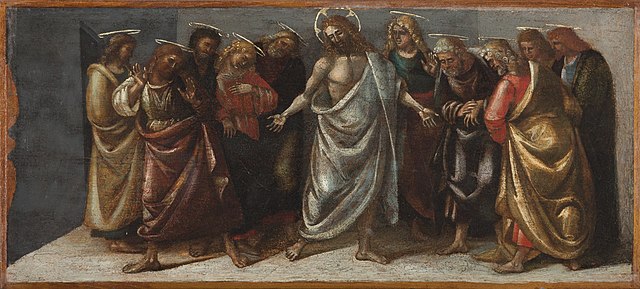
3rd Sunday of Easter 2024
Fr. Mark Gatto
Preached: April 14, 2024
Jesus has wounds. He had wounds even after the Resurrection. Our Christian Faith teaches that Jesus is truly God and truly human. Fully human like us in all things but sin. He suffered and he died. After his Resurrection, the Risen Lord is made known to the the disciples in various ways. It says that Jesus was made known to them in the breaking of the bread. In the appearance in today’s Gospel it says that “he showed them his hands and his feet.” In seeing and touching the wounds of Jesus, they recognized his risen presence with them.
After his death, the disciples struggled with their faith. They were lost in a moment of doubt, abandonment and suffering. The presence of the Risen Lord Jesus gave them hope and courage to move forward. If we are struggling with our faith, if we are feeling abandoned by God or going through some suffering, then we too need to experience the presence of the Risen Lord Jesus. One way we experience the Risen Lord is in the Breaking of the Bread, the Eucharist. But another important way is through seeing and touching the wounds of Jesus.
Where will see and touch the wounds of Jesus today? In suffering and wounded humanity. Jesus shared our humanity, to suffer with us. In the wounds of humanity, we see and touch the wounds of Jesus. In the one human family, in our world today, we need to see the wounds causing so much suffering. In poverty, in war, in divisions. Are we ready to look upon the wounds of humanity? With faith we see and touch the wounds of Jesus in the wounds of humanity. That needs to lead us to work for peace and to heal these wounds in whatever way we are able.
Where will see and touch the wounds of Jesus today? In the wounds found in the body of Christ, the Church. St. Paul speaks of the church as the body of Christ. In the wounds of the church we see and touch the wounds of Jesus. Sometimes wounds caused by persecution.
Recently when in Rome I went to visit the Church of St. Bartholomew on Tiber Island. They created a sanctuary there to remember the martyrs of the 20th and 21st Century. In the various side chapels there was a memory of recent martyrs in various parts of the world. Asia and Oceania, in America, in Europe, in Africa and martyrs of Communism and martyrs of Fascism. Martyrs who were Catholic and also of other Christian churches. When we see these wounds of Jesus in the wounds of the church caused by persecution, it should strengthen our faith by the witness of martyrs.
But we also see wounds caused by injuries and abuse within and by the church itself. Are we ready to see and touch the wounds caused by our church with honesty and desire to work to heal them?
Where will we see and touch the wounds of Jesus? Within ourselves as well. Our own sufferings, our own grief, the hurts and betrayals of life. Jesus embraced our humanity. We can face our own wounds for there we see and touch the wounds of Jesus.
When we are struggling with doubt, with sense of abandonment, with suffering, our faith does not ignore these realities. Like the disciples of Jesus, we need to experience the presence of the Risen Lord Jesus. We need to see and touch the wounds of Jesus found in wounded humanity, found in the wounded body of Christ, the Church and in the wounds within our own lives. Faith allows us to recognize Jesus even in these wounds and then moves us to act to bring healing and light.
You Have To Look Where You’re Going
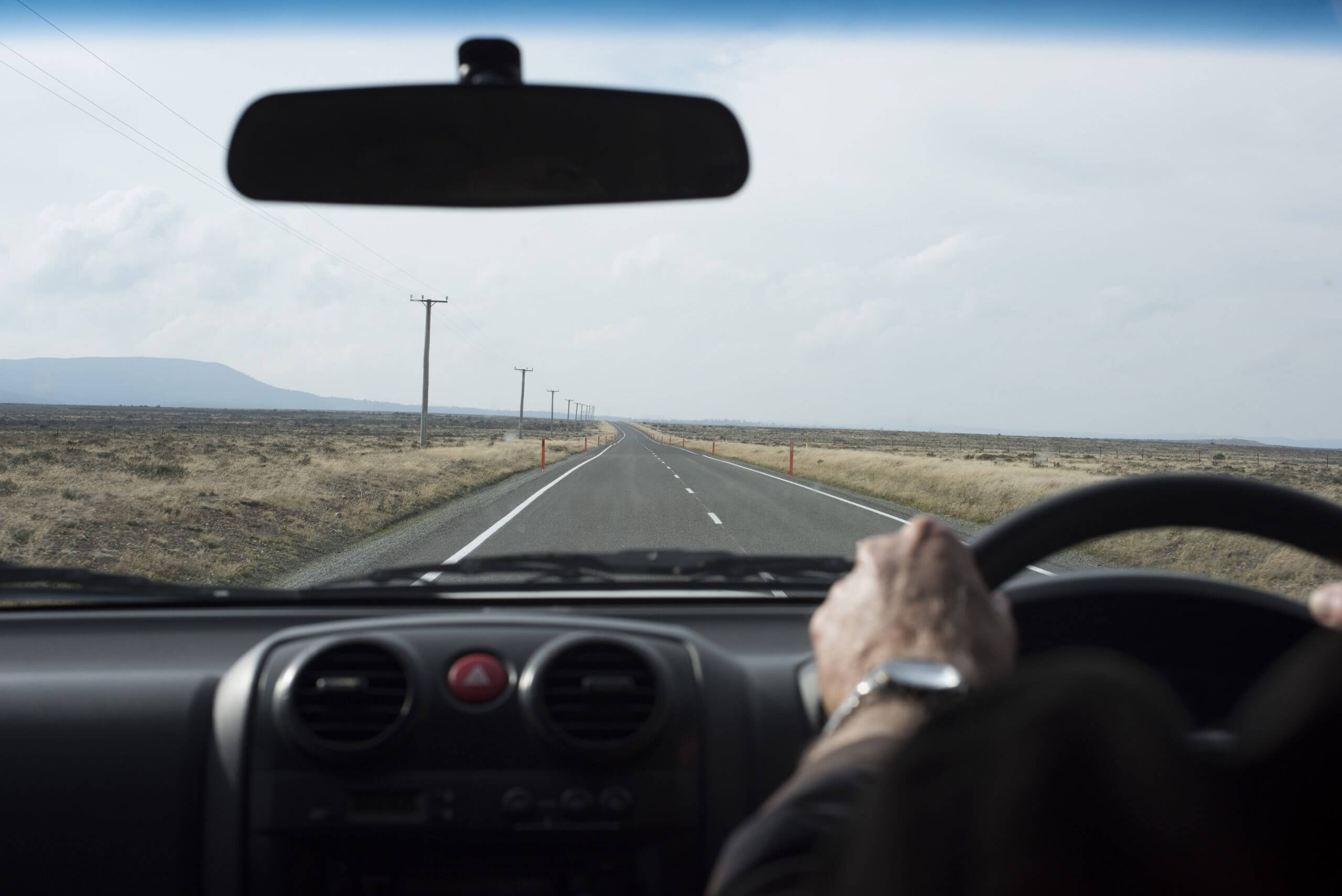
2nd Sunday of Lent
Deacon Tom Vert
Preached: February 25, 2024
You have to look where you are going!
How many people here have taught their children, grandchildren, or others how to drive a car?
One of the first lessons to learn is that you need to look where you are going! If you look straight ahead far down the road, you will drive straight ahead. If you start to look towards the left or right, or at a truck, you will naturally drift that way, subconsciously you can’t help it. This puts you and the car in danger.
Looking where you are going is one of the keys to driving safely.
In the spiritual life, looking where you are going is also critical to staying on the spiritual path, and in my opinion, one of the key reasons for the transfiguration. Jesus knew that his time was coming to an end, he was nearing Jerusalem, and his passion and death were coming close. But also, his resurrection would be coming, and he needed Peter, James, and John, to focus on that truth, focus on that vision of what would happen in order to help get them through the challenges after the crucifixion.
This experience of seeing Jesus’ figure transformed with dazzling white bright energy and the voice of God coming down to say “this is my beloved Son, listen to him”, were key moments that they could anchor on to in their absolute grief after his death.
This moment enhanced their faith even more, just like the moment we saw for Abraham in the first reading. We see Abraham passes this test of faith of offering up his son Isaac, because he already had a close relationship with God who had proven time and again how much he loved Abraham.
Abraham had the history of God supporting him as he moved out of his homeland in Babylon to Israel. He had the focus of the three angels visiting him in the tent and the gift of God of his son Isaac, born to Sarah in her very old age. This knowledge in his heart, this focus, of a loving, caring God allowed him to go through this test, this struggle, with faith in his heart and get even closer to God.
This close relationship, this vision of where we are going is emphasized by St. Paul also in the second reading. He tells the Romans (and us), If God is for us, who can be against us?
In other words, if God is at the centre of our lives, and we have this focus that he has promised us his presence now and in eternal life, then how can we let the distractions of everyday live, the stresses make us look to the side and go off of the spiritual path?
In the verses immediately after today’s readings, Paul makes it crystal clear to all of us when he says: “Who will separate us from the love of Christ? Will hardship, or distress, or persecution, or famine, or nakedness, or peril, or sword?
“For I am convinced that neither death, nor life, nor angels, nor rulers, nor things present, or things to come, nor powers, nor height, nor depth, nor anything else in all creation, will be able to separate us from the love of God in Christ Jesus our Lord”.
This love of Christ, that shines forth so bright that we can’t even look at it is available to us each and every day. It is not something that only happened 2000 years ago, but it is offered to us here and now.
I love how our new church has this symbolically for us to see! Look at the rays that shine forth around Jesus, in a way, transforming the image to show God’s love shining towards us. It is a great reminder of the transfiguration and this symbol of God showing us the way!
God we are told, did not spare his only Son, as he desires to be in a loving relationship with us! His arms are open for us to enter and be close to him!
So how do we put this knowledge to use in our daily spiritual life?
When the storms of life come, the diagnosis of cancer, the loss of a loved one, the failed relationship, or the job stresses, then come to this church during the day, before or after mass, whenever you need to and look directly at our crucified Jesus with the light surrounding him, and say to yourself “You have to look where you are going!”
Choose Faith!
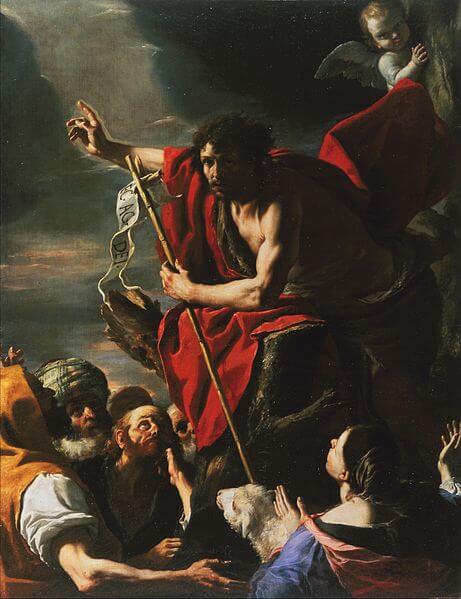
2nd Sunday of Advent 2023
Fr. Mark Gatto
Preached: December 10, 2023
During a visit to one of our Catholic high schools, a young student was speaking to me and he told me that he no longer believed in God. He was a serious and good young man. This was something that he had really reflected on for some time. I realized that he was actually going through what we sometimes call the “dark night of the soul.”
When we do not sense or feel or experience the reality of God. Any faith we may have had at one time seems to be gone. It can feel somewhat empty. What we do not always realize is that this “dark night of the soul” is actually part of the journey of moving to a deeper and truer faith. It clears away childish and simplistic faith and leads to something deeper.
For faith is not a feeling, it is a choice. Just as deep love is not a feeling, it is a choice. At times our love may be full of feeling, but it is in choosing to love even when the feelings are not strong that leads to deeper love. Also with faith, it is in choosing faith even when there are no feelings of God that leads us to a deeper faith.
God wants to be known by us. God chooses to reveal God self to us. God wants to be loved. It is not that we long or desire or search for God. It is God who longs and desires and searches for us. God wants to be revealed to us.
God is infinite, eternal spirit. We human beings are finite creatures. Therefore we are not able to see or experience God directly. It is always indirectly through created reality that God is revealed to us. God is revealed in our experiences of love, beauty, truth, Sacraments, words in the Sacred Scriptures, in creation and in encounters with one another.
God is mystery that we never solve. We can always go deeper. There is always more to be revealed. In fact, in our Catholic teaching in the Catechism of the Catholic Church it says, “Our human words always fall short of the mystery of God.”
This season of Advent is a time of hoping and waiting and longing for God. In Advent we listen to the Prophet Isaiah offering beautiful and poetic images that reveal a God who deeply longs for us. Isaiah describes a voice crying out in the wilderness, “the glory of God shall be revealed.”
God is constantly reaching out into the universe, into our world to be revealed to our hearts. Ultimately in Jesus, the mystery of God entered our human history and reality. To walk with us in a way we could see and hear.
In today’s Gospel we saw the people going out to John the Baptist, they were longing, hoping for the action of God. They were preparing themselves to be touched by God by confessing their sins and being baptized in the river by John.
During this Advent season, do not worry about whether you have faith or not. Choose faith. Prepare your hearts to be ready to recognize God being revealed to you. In Sacrament, in the Word of God, in experiences of love and beauty. God is longing and yearning to be known by us. During Advent, have a heart that longs and hopes and prays and hungers for God.
The Test Of Our Catholic Faith – Will You Pass?
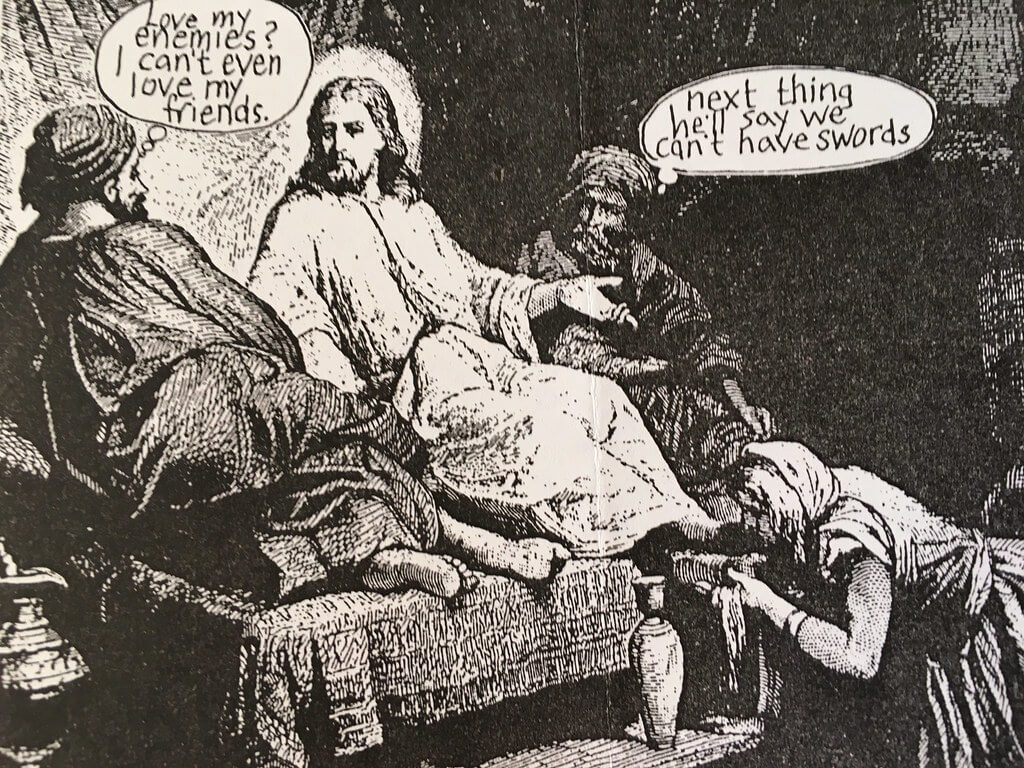
7th Sunday Ordinary Time
Fr. Mark Gatto
Preached: February 20, 2022
“Love your enemies, do good to those who hate you.” Any Christianity that does not take this teaching seriously is superficial and self serving. In fact, the test of our Christian Faith is not if we go to church on Sunday, but do I love my enemies, have I removed hate from my heart?
This is the non-violent vision of Jesus. It is a way of being in this world, a way of being in relationship with our fellow human beings. It is a way of speaking, a way of disagreeing, a way of fighting for justice that rejects violence. It is a way of facing hatred and division without becoming hatred.
In our world today, division, polarization, hatred are all so prevalent. We see divisions between nations, in the news today we see the situation in Ukraine, but we can look throughout our world and see so many examples of division and opposition between nations. Within our families we see so many cases of division and separations.
Within our church we see real polarization, with one group attacking another. We just have to go on Catholic Twitter to see that. Our challenge is to face all of this without giving in to hatred within ourselves. This non-violent vision is not passive. We face evil, we confront injustice, but never with violence, nor with vengeance.
The greatest obstacle to us embracing Love of our enemies is fear. Thomas Merton said, “fear is the root of all violence.” We need to be aware of our fear, what causes me fear. When I do not recognize fear within myself, then I will simply respond, “I hate you.” We need to say rather, “I am afraid.”
When someone is racist, it is usually rooted in a deep fear of those who are different or of losing some privilege. When countries go to war, it is often rooted in fear, fear of losing something, fear of the other which has often been formed over history. When someone is xenophobic and attacks immigrants or refugees, it is usually rooted in fear of losing something or of those who are different. We need to be aware of what we fear. I need to say, “I am afraid” rather than “I hate you.”
When we are fearful, our response is to strike out, attack, destroy the other. Anger inside of us is usually rooted in deep pain, from hurts within us. Over the years in a parish, I have often spoken to office staff about dealing with angry people. I would tell them not to take it personally and realize that when someone is reacting in such anger it is usually rooted in some deep pain they have within, that might not even be related to the present situation. It is for this reason that Martin Luther King said, “hate cannot drive out hate, only love can do that.”
Our mission as the Catholic Church in the world today, our mission as disciples of Jesus today, has to include being instruments of peace. The way we speak, the way we oppose injustice, the way we share our faith, it has to be in a non-violent way. We need to overcome fear, not be guided by fear. Fear is a terrible spiritual director.
We need to be instruments of peace in our families, in our church, on social media, in our world. To be such an instrument of peace we first of all need to find peace within ourselves, we need to struggle to overcome fear and hatred within ourselves.
The God whom Jesus revealed rejects all forms of vengeance and demands no victims. This Kingdom of God means the complete elimination of every form of violence between individuals and nations.
Become instruments of peace, our world desperately needs instruments of peace. The survival of our world and of humanity depends on this.
Perhaps my favourite prayer is known as the Prayer of St. Francis. “Lord, make me an instrument of peace. Where there is hatred, let me sow love.” It goes on to say, “grant that I may not so much seek to be understood, as to understand.” We all want to be understood, we want others to understand how I am feeling, what my views are and so on.
But, the way of the Gospel requires that we first of all try to understand the other person first, what they are feeling, what they are thinking, how they may be hurting inside. It is this dying to self that allows us to be an instrument of peace.
“Love your enemies, do good to those who hate you.”
This is the key test of our Catholic Faith. By overcoming fear and hatred within myself, then it is possible for me to become an instrument of peace.
Where Is Your Heart?
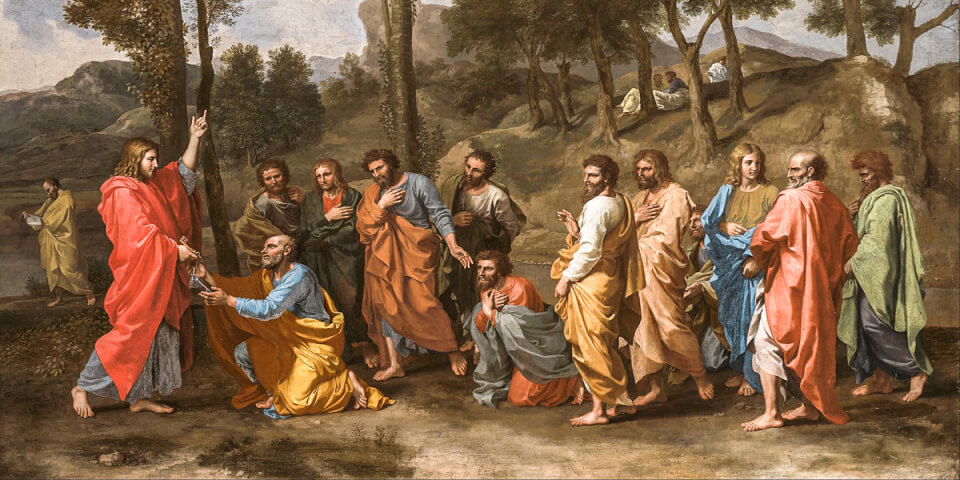
21st Sunday In Ordinary Time
Fr. Mark Gatto
Preached: August 22, 2021
Who or what do you serve? Who or what do you follow? We all serve and follow someone or something. As Catholics we would like to believe that we serve the living God, that we follow the Lord Jesus. But if we honestly examine our lives we will often find that we are serving something in this world. It might be the desire for money or the desire to be popular or the desire for security or the desire to be successful.
Who or what do you serve? Though we say that we serve and follow Jesus, if we honestly examine our lives we will often find that we are mostly just serving ourselves. I am following my own whims and interests.
We just saw a critical moment in the mission of Jesus. Many are leaving Jesus, they have decided not to follow him anymore. As they start leaving, Jesus turns to Peter and his apostles and asks them, “Do you also wish to go away?” We are faced with that same decision today.
Many of you speak to me about family, about friends, about colleagues who no longer practice the faith. They have decided to turn back like some of the disciples in this gospel. Jesus turns to you and to me and asks us as well, “Do you also wish to go away?” We have a decision to make, we have a choice to make in our life. Who will we serve, who will we follow?
If someone was to follow me around for one month, twenty four hours a day following everything I do, what would they see in my life? How do I spend my time and my energy? How do I use my money? What am I reading and watching? Who do I spend my time with and what do I do with my free time? How do I speak and what do I speak about? That person following me around and watching me, would they say, this is a person who serves and follows Jesus?
Maybe the key question is, where is your heart?
Someone once said that Love is a choice, not a feeling. In fact the key to love is to choose it even at times when we are not feeling it. The key to any vocation is to choose to love even when not feeling it. In marriage, a couple do not always feel wonderfully romantic and “in love”. There are times when there is no feeling at all or at least it is just very ordinary. This is when a person needs to continue to choose to love.
Same with priesthood or religious life. It is not always an exciting and mystical experience. Sometimes a priest wakes up and does not feel the presence of God at all and for the most part it is just very ordinary. That is when a priest needs to continue to choose to love.
Just as love is a choice, faith is also a choice. We need to make that choice of faith. Even when not understanding fully, even when not feeling anything special. At those times we need to make the choice of faith. Like Peter we need to answer Jesus, “Lord, to whom can we go, you have the words of eternal life.”
Love and faith are both a choice. It is a choice we need to make day by day. Even when not feeling it, even when the people around us are turning away from faith or rejecting it. We make that choice by the decisions we make in our life, by where we put our time and energy. What would someone see if they were to follow us this whole day?
Who would they say we serve and follow? Where is your heart?


